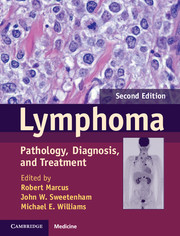Book contents
- Frontmatter
- Contents
- Preface to second edition
- Preface to first edition
- List of contributors
- 1 Epidemiology
- 2 Prognostic factors for lymphomas
- 3 Imaging
- 4 Clinical trials in lymphoma
- 5 Hodgkin lymphoma
- 6 Follicular lymphoma
- 7 MALT and other marginal zone lymphomas
- 8 Small lymphocytic lymphoma/chronic lymphocytic leukemia
- 9 Waldenström's macroglobulinemia/lymphoplasmacytic lymphoma
- 10 Mantle cell lymphoma
- 11 Burkitt and lymphoblastic lymphoma: clinical therapy and outcome
- 12 Therapy of diffuse large B-cell lymphoma
- 13 Central nervous system lymphomas
- 14 T-cell non-Hodgkin lymphoma
- 15 Primary cutaneous lymphoma
- 16 Lymphoma in the immunosuppressed
- 17 Atypical lymphoproliferative, histiocytic, and dendritic cell disorders
- Index
14 - T-cell non-Hodgkin lymphoma
Published online by Cambridge University Press: 18 December 2013
- Frontmatter
- Contents
- Preface to second edition
- Preface to first edition
- List of contributors
- 1 Epidemiology
- 2 Prognostic factors for lymphomas
- 3 Imaging
- 4 Clinical trials in lymphoma
- 5 Hodgkin lymphoma
- 6 Follicular lymphoma
- 7 MALT and other marginal zone lymphomas
- 8 Small lymphocytic lymphoma/chronic lymphocytic leukemia
- 9 Waldenström's macroglobulinemia/lymphoplasmacytic lymphoma
- 10 Mantle cell lymphoma
- 11 Burkitt and lymphoblastic lymphoma: clinical therapy and outcome
- 12 Therapy of diffuse large B-cell lymphoma
- 13 Central nervous system lymphomas
- 14 T-cell non-Hodgkin lymphoma
- 15 Primary cutaneous lymphoma
- 16 Lymphoma in the immunosuppressed
- 17 Atypical lymphoproliferative, histiocytic, and dendritic cell disorders
- Index
Summary
Introduction
T-cell non-Hodgkin lymphomas (NHLs) are uncommon malignancies, representing approximately 10–12% of all lymphomas in the United States. Varied geographic frequencies of T-cell NHL have been documented, ranging from 18% of all NHLs diagnosed in Hong Kong to 1.5% in Vancouver, British Columbia. This may in part reflect increased exposure to pathogenic factors such as human T-cell leukemia virus I (HTLVI) and Epstein–Barr virus (EBV) in Asian nations. Immunophenotypic, cytogenetic, and molecular analyses have significantly enhanced the diagnostic capabilities as well as improved classification and prognostication for T-cell NHL. It is advocated that all cases of T-cell NHL be reviewed by an expert hematopathologist.
The current World Health Organization (WHO)/European Organization for Research and Treatment of Cancer (EORTC) classification recognizes seven distinct clinicopathologic non-cutaneous peripheral T-cell NHLs (Table 14.1). They include peripheral T-cell lymphoma (PTCL), not otherwise specified (NOS); angioimmunoblastic T-cell lymphoma (AITL); adult T-cell leukemia/lymphoma (ATLL); NK-/T-cell lymphoma (NK/TCL), nasal type; enteropathy-associated T-cell lymphoma; hepatosplenic T-cell lymphoma; and anaplastic large-cell lymphoma (ALCL), anaplastic lymphoma kinase-positive (ALK+) subtype; additionally, ALCL ALK- subtype is a provisional subtype in the most recent WHO classification. Subcutaneous panniculitis-like T-cell lymphoma and cutaneous γδ T-cell lymphoma are also discussed herein since these diagnoses portend similar prognoses to many of the above non-cutaneous T-cell NHLs and treatment paradigms are similar. Cutaneous T-cell lymphoma (CTCL) and the other primary cutaneous lymphomas are reviewed elsewhere.
- Type
- Chapter
- Information
- LymphomaPathology, Diagnosis, and Treatment, pp. 226 - 253Publisher: Cambridge University PressPrint publication year: 2013



